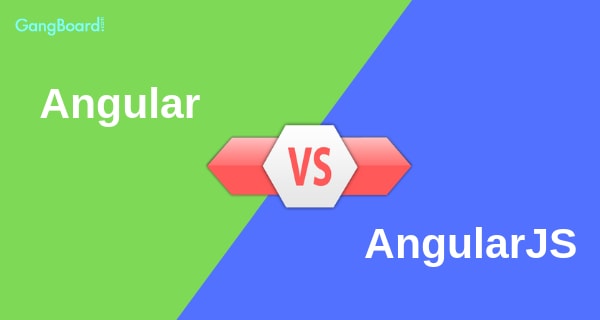In this article, you will learn about the difference between Angular and AngularJS.
Angular
It is a very well known top front-end framework. It uses Microsoft’s TypeScript language which has many advantages like type declarations, type checking, object-oriented features and the benefits of ES6 like iterators and lambdas.
It has many versions like 2, 4, 5, 6, 7, 8 and they all are completely different from AngularJS. Angular Versions above 4 are just improvements and are backwards compatible with Angular.
In this, we use round braces “( )” for event binding and square brackets “[ ]” for property binding. In this, we are also using structural derivatives to put conditions in the HTML template.
Angular gives a better structure to more easily create and maintain big applications and a better change detection mechanism.
Pros:
- TypeScript (TS) improves the code quality and efficiency using the OOPS (Object-Oriented Programming System) concept.
- It’s a mobile-oriented.
- In this, it updated the dependency injection technique and improved modularity means you can make the program independent.
- It gives more option for programming languages like TypeScript (TS), EcmaScript5 (ES5), and EcmaScript6 (ES6) for writing codes.
- You can easily configure routing in different file or module.
- Flexible when using filters
Cons:
- It is a little complex to configure as compared to AngularJS.
- It is incapable if you only want to build simple, static web apps.
AngularJS
It was created in 2009. This brings us the concept of two-way data binding. It is an open-source, JavaScript-based, best framework for web app development.
Pros:
- It has model data binding which makes web application development real quick.
- Practising HTML as a structural lang. makes things easier to do.
- It’s a perfect solution for fast web development because it does not need any other frameworks (set of libraries).
- AngularJS applications can execute on all important programs and advanced phones including iOS, Android.
Cons:
- It is big and complex because of the various ways of doing the same thing.
- If we want to scale our app then its implementation is not easy.
- If the user of an AngularJS web app disables JS, then only the basic page is clear to the user.
- There’s a slow response in loading UI if there are more than 200 viewers.
The thing i.e common in angular & angularJS is that both are bi-directional means the two-way binding is done in both.
We can compare both based on architecture, language, expression syntax, mobile support, and routing.
Angular vs AngularJS – Difference between Angular and AngularJS

| Angular | AngularJS |
| It is a framework. | It is a library. |
| The architecture in this framework is entirely component-based means it’s composed of encapsulated, loosely bound components. | The architecture in this library is based on the model-view-controller (MVC) design. |
| It’s easy to create native applications for the mobile platform using Angular 2.0. | It does not support for native applications for the mobile platform. |
| It comes with a built-in dependency injection subsystem for better. | There are issues with dependency injection in AngularJS. |
| Controllers and $scope are replaced by Controllers and Derivatives. | Controllers and $scope are key components. |
| Build using typescript which is a superset of JS (ES6). | Built using javascript. |
| Angular uses @RouteConfig{(…)} decorator. | AngularJS uses $routeprovider.when() to configure routing. |
Comment below if you have any queries related to difference between Angular and AngularJS.
The post Angular vs AngularJS – Difference between Angular and AngularJS appeared first on The Crazy Programmer.
No comments:
Post a Comment